
The Entropy of Mankind
The Second Law of Thermodynamics As Applied to Us
There is a law of the created world that was formulated during the second half of the 19th century. A physicist named Clausius was the first to use the word entropy to characterize this law, which has become known as the second law of thermodynamics. This law states that the disorder of the universe is constantly increasing in a single direction. The law states that energy is continuously being transformed from usable to less usable forms. Put another way, the energy of the universe is continuously becoming more disordered; i.e., entropy is increasing as this disorder continues.1
This increase in entropy with the second law of thermodynamics contrasts with the first law of thermodynamics, which states that the total energy of the universe is always the same. Albert Einstein claimed, E = MC2, where energy equals mass (M) times the speed of light (C) squared. Thus, matter as we perceive it — comprised of atoms, molecules, and their parts — is merely the shape energy has taken, while it is interconvertible with acoustic, solar, mechanical and electrical energies, which exist as waves and frequencies within the sea of energy in which all things exist. Some researchers, such as Dewey Larson, have said that matter is really this invisible energy which has been set in motion2 … which we as believers in God’s word can prove through any number of Scriptures.
“In the beginning God created the heavens and the earth …. Then God said [spoke in frequencies] ‘Let there be light;’ and there was light” (Genesis 1:1, 3).
“For He spoke [in frequencies], and it was done; He commanded, and it stood fast: (Psalm 33:9).
“By faith we understand that the worlds were framed by the word [frequencies] of God, so that things which are seen were not made of things which are visible” (Hebrews 11:3).
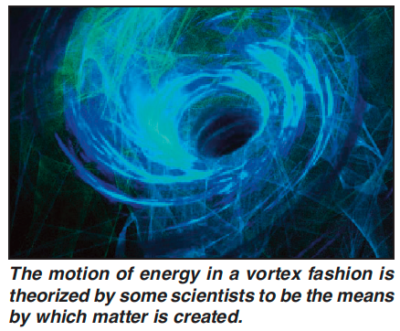
I use the word “frequencies” in the above verses to describe God’s word, because in this way He transformed the invisible energy that is throughout the universe into the components of what we call “matter”: protons, neutrons, electrons, and the even the smaller components of atoms. Perhaps matter is infinitely divisible. By speaking or formulating these designs in His mind and words, what we call matter was made from formless energy. E = MC2. What we call matter is really nothing but the mind of the Creator expressing His patterns for the components of the rocks, minerals, oil, light, water, air, and carbonaceous beings that make life as we know it. “For by Him all things were created that are in heaven and that are on earth, visible and invisible …. All things were created through Him and for Him” (Colossians 1:16).
While the energies of the universe are “winding down,” as it were, towards a final state where, physicists have surmised the temperature will approach minus 273o C after an interminable time has passed,3 we see a counteracting force called life that contradicts this second law of thermodynamics. Rather than moving incessantly towards disorder, life as created by God reverses entropy, or gives a negative entropy … increasing order. That process begins with sunlight energy being captured by photosynthetic pigments and, through the process of photosynthesis in plants and certain microbes, this energy — should we say certain frequencies of the electromagnetic spectrum — is captured in the form of chemical bonds within carbonaceous compounds. Carbon dioxide is extracted from the air within leaf intracellular spaces and incorporated enzymatically with other elements — such as nitrogen, oxygen, sulfur, hydrogen, iron, copper, manganese, zinc, and calcium, and magnesium, within an environment bathed in structured cellular water — into various sugars, starches, proteins, lipids, vitamins, and other compounds are generated to create the structure and function of the plant. These plants — those that are good for food — can be consumed directly by people as fruits, nuts, vegetables, and other plant parts, or indirectly by consuming clean animals, birds, and fish that feed on plants.
Of course, not all plant energy is used to produce food crops, but much of it goes into growing trees, grasses, and other plants that serve mankind through lumber, fuel, and other purposes. These plants protect the soil from erosion, and add to the soil organic matter stores that serve as the heart of soil productivity and health. Yet, the process that makes life possible on earth is photosynthesis … the converting of sunlight energy into the substance of plants, which sustains civilization through the production of food, feed, and fiber. It is God’s plan for life. Without that plan the earth would be a sterile, charred moonscape.
While entropy is reversed locally on earth by people, and animals — order created out of disorder — the entire universe still upholds the second law of thermodynamics: entropy increases continuously. Energy flows downhill towards greater chaos and disorder. This fact brings to mind the stark realities of Romans 8:20-22.4
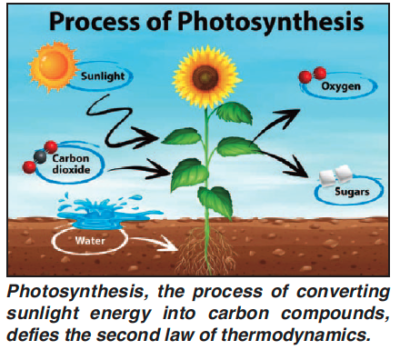
“For the creation was subjected to futility, not willingly, but because of Him who subjected it in hope; because the creation itself also will be delivered from the bondage of corruption into the glorious liberty of the children of God. For we know that the whole creation groans and labors with birth pangs until now.”
futility = mataiotes, “transientness, depravity;” from mataios, “empty, profitless.”
bondage = douleia, “slavery.”
corruption = phthora, “decay, ruin;” from phtheiro, “to shrivel or wither, spoil, ruin.”
Paul is describing the created universe now as being transient and decaying — held hostage to the second law of thermodynamics — as we see aging, sickness, death, disorder, and stresses all around us which entered with the advent of sin into the world (Genesis 3:1-19). At this point the soil was cursed [arar, “execrate, or call down evil upon”], and it would produce food only through sweat, toil, and pain (Genesis 3:17-19). Yet, the context of Romans 8 indicates that there will be a turnaround from the groaning and laboring of this present age, in which aging and death hold sway, with a “deliverance from the bondage of corruption” (verse 21) to the glorious spirit nature of the elect … which pain of living is characterized by “birth pangs” (verse 22) preceding that incredible change to spirit. As verse 19 states, the whole creation awaits in eager expectation for the resurrection of the elect into eternal spirit. David also talks about the entropy of the universe in Psalm 102:25-26 (quoted in Hebrews 1:10-11).
“Of old You laid the foundation of the earth, and the heavens are the work of Your hands. They will perish, but You will endure. Yes, they will all grow old like a garment; like a cloak You will change them, and they will be changed.”
I raise the point, if the whole creation — which includes not just carbon-based living things but rocks and animals, water, air, and all matter — is eagerly waiting the return of Christ and the resurrection, might this massive turning point in history in some way reverse certain aspects of entropy, at least on the earth? I cannot imagine that heat will cease to flow from hot to cold, or the sun will not continue to slowly lose its mass as light streams out of it to all of the universe, but perhaps some basic energetic phenomena will be altered at the return of Christ, the resurrection, and the setting up of the Kingdom of God on earth. After all, we read in Revelation 21:5 that the One who sat on the throne of heaven stated, “Behold, I make all things new [kainos, “new and fresh”]. Further,
“For behold, I create new heavens and a new earth; and the former things shall not be remembered or come to mind” (Isaiah 65:17).
“‘For as the new heavens and the new earth which I will make shall remain before Me,’ says the Lord, ‘so shall your descendants and your name remain’” (Isaiah 66:22).
“Nevertheless we, according to His promise, look for new heavens and a new earth in which righteousness dwells” (II Peter 3:13).
“Now I saw a new heaven and a new earth, for the first heaven and the first earth had passed away. Also there was no more sea” (Revelation 21:1).
It appears that there will be a total renewal of the earth and all that is on it when the millennial reign of Christ and the saints begins. If there is not a reversal of entropy planet-wide — perhaps even universe-wide — then at the very least this awesome event is prophesied to renew planet earth and all of its systems: “Behold, I make all things new.” Perhaps we can call this event a “great reset” of energies and things. We can prove that at one time in the distant past the universe was in a higher state of organization because, due to entropy, the slide into disorganization is still continuing.
This steady and continuing disorganization proves there had to be more a highly organized beginning, and God made that beginning. Perhaps He periodically renews the energies of the cosmos, or at least parts of it, like He will at the beginning of the new age just ahead.
Spiritual Entropy
Curiously, the word scientists have chosen to describe the declining order of the universe is also used in Scripture. That word is the Greek entrope, and is used in two places. Let us get the whole context of the matter in these two Scriptures.
“Dare any of you, having a matter against another, go to law before the unrighteous, and not before the saints? Do you not know that the saints will judge the world? And if the world will be judged by you, are you unworthy to judge the smallest matters? Do you not know that we shall judge angels? How much more, things that pertain to this life? If then you have judgments concerning things pertaining to this life, do you appoint those who are least esteemed by the church to judge? I say this to your shame [entrope]. Is it so, that there is not a wise man among you, not even one, who will be able to judge between his brethren? But brother goes to law against brother, and that before unbelievers!” (I Corinthians 6:1-6).
“Do not be deceived: ‘Evil company corrupts good habits.’ Awake to righteousness, and do not sin; for some do not have the knowledge of God. I speak this to your shame [entrope]” (I Corinthians 15:33-34).
In both of these citations where Paul is addressing the Corinthians, the word entrope is used to indicate “turning in upon oneself, producing a recoil effect from what is vile.” It is derived from entrepo, meaning “to invert or turn in, or put to shame,” as in I Corinthians 4:14, II Thessalonians 3:14, and Titus 2:8. As Kohlenberger states, the word entrepo means “… to turn one upon himself and so produce a feeling of ‘shame,’ a wholesome ‘shame’ which involves a change of conduct.”

A Public Shame
Just as entropy in science denotes the measure of disorder in a given system, so entrope (shame) in Scripture describes a decline into disorder of character. While to us, shame means a turning in to oneself on a personal psychological basis, in Paul’s world shame was more of a public concept.
In fact, these members of the Corinth congregation were doing much the same as psychology teaches in today’s world. Psychology has turned inward, focusing on individual feelings and personal struggles of the inner being. Shame is a reflection of the focus on people’s unworthiness and flawed character. Because psychology looks toward the inner self, its solutions are also focused inwardly: positive self-talk, meditation, and disconnecting from the evaluation of others.
At the time Paul wrote his letters, shame meant the loss of reputation and respect, and was accompanied by personal feelings of humiliation and chagrin in the context of a community. Whereas guilt implies a personal inner failure and self-condemnation, shame in the time of Paul referred to a communal failure. He is saying the entire congregation was preoccupied with internal issues while not reaching out as lights to the community around them (Matthew 5:14-16).
The congregation was “spiraling inward,” as it were, and not getting rid of the mindset that brought about the shame in the first place. Whereas man’s psychological solution to overcoming shame is to focus on individual effort and adjustment, the solution Scripture gives is to focus on the spiritual community. As one commentator stated,
“Shame is a community issue. It can only be addressed within community. Overcoming shame requires vulnerability, and vulnerability demands intrapersonal relationship. Instead of spiraling inward, we must discover spiraling outward.”5
Spiraling outward requires our involvement with others. We must reach outside of ourselves and share our very beings with others. While entropy in the physical sciences means the deterioration of energy to its lowest and most basic form, entropy for people is what we might term a death spiral towards inward preoccupation and selfishness. The solution to this terrible terminus is to inject God’s spiritual energy into the system and reverse this entropy, and create a life cycle of losing ourselves in the lives of others. … first within the community of the elect, and also within society around us. This instruction is absolutely front and center to the lives of each one of us within the ecclesia.
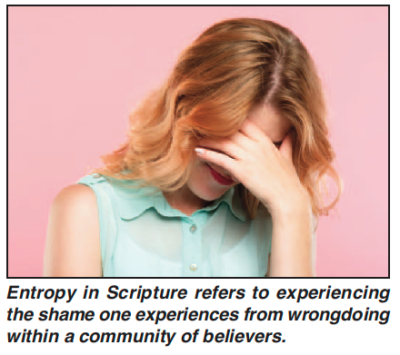
Reducing or Eliminating Entropy
While reversing entropy within the physical universe is impossible unless living systems, through photosynthesis, capture sunlight energy and convert it into more usable forms, we within the body of Christ on a spiritual level must, on a community level, overcome the increase in randomness of the system with the instructions given in God’s word. They are simple and straightforward, cutting to the very heart of our purpose in being here — why our Creator made us in the first place. We see a society today that is clamoring along the broad way.
“Enter by the narrow gate; for wide is the gate and broad is the way that leads to destruction, and there are many who go in by it. Because narrow is the gate and difficult is the way which leads to life, and there are few who find it” (Matthew 7:13-14).
Our vocation as saints of the Most High defines the pathway of negative entropy and overcoming shame. Let us examine this way of life which leads to such amazing abundant living (John 10:10), and ultimately to eternal life … which is the absolute violation of the second law of thermodynamics, if such a law exists in the spirit realm. I doubt that it does. None of the points below are exclusive; they all interrelate.
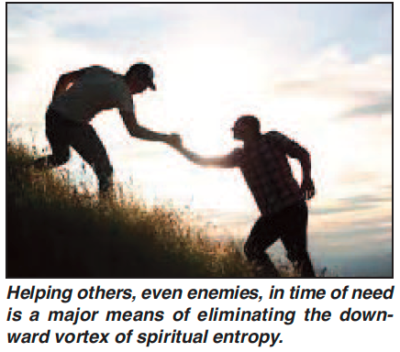
1. Do good to those in the ecclesia, and to others when opportunity permits.
“And let us not grow weary while doing good, for in due season we shall reap if we do not lose heart. Therefore, as we have opportunity, let us do good to all, especially to those who are of the household of faith” (Galatians 6:9-10).
Even to those who hate us we are told to be kind, gentle, and forgiving, for as Paul stated,
“Beloved, do not avenge yourselves, but rather give place to wrath; for it is written, ‘Vengeance is mine, I will repay’” (Romans 12:19).
We are to feed our enemies and give them drink, thus heaping coals of fire on their heads, even as Jesus washed Judas’ feet only hours before he betrayed Him (John 13:2-5). We are to forgive those that sin against us seventy times seven (Matthew 18:21-22).
2. Utilize your spiritual gifts to the full.
“As each one has received a gift, minister it to one another, as good stewards of the manifold grace of God” (I Peter 4:10).
“For as we have many members in one body, but all the members do not have the same function, so we, being many, are one body in Christ, and individually members of one another. Having then gifts differing according to the grace that is given to us, let us use them …” (Romans 12:4-6).
These spiritual gifts are bestowed upon us at baptism and the laying on of hands (I Timothy 4:14), and are summarized in I Corinthians 12: wisdom, knowledge, faith, healing, miracle working, discerning spirits, tongues, interpretation of tongues, and many others that we might include such as hospitality, administration, prophesying, and interpreting dreams. All of us with our varied gifts are connected to the body, with each member set within the body “as God has pleased” (I Corinthians 12:18). No part is more important or less important than the others, and each part is designed to contribute to the overall exuberant and healthful functioning of the whole, “… given to each one for the profit of all” (verse 7). As I Corinthians 10:17 emphasizes, “For we, though many, are one bread and one body; for we all partake of that one bread.” That bread is defined in verse 16 as the body of Christ, and as He gives life through His body and blood to each of us as members of that body, so we uplift and serve one another as being integral parts of the body.
3. Be involved with the needs of the brethren. The unity and concern each of the elect must have for the others has been echoed by many others outside the ecclesia, such as John Donne.6
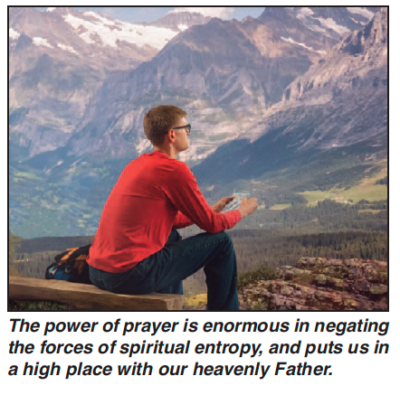
No Man Is an Island
No man is an island, entire of itself;
Every mand is a piece of the continent, a part of the main.
If a clod be washed away by the sea, Europe is the less,
As well as if a promontory were: as well as if a manor of thy friend’s
Or of thine own were.
Any man’s death diminishes me, because I am involved in mankind.
And therefore never send to know for whom the bell tolls;
It tolls for thee.
Admonitions to serve one another in whatever capacity we can are rife throughout Scripture. Here is small sampling.
“If there is among you a poor man of your brethren, within any of the gates in your land which the Lord your God is giving you, you shall not harden your heart nor shut your hand from your poor brother, but you shall open your hand wide to him and willingly lend him sufficient for his need, whatever he needs …. You shall surely give to him, and your heart shall not be grieved when you give to him, because for this thing the Lord your God will bless you in all your works and in all to which you put your hand” (Deuteronomy 15:7-8, 10).
“Let each of you look out not only for his own interests, but also for the interests of others” (Philippians 2:4).
“Let no one seek his own, but each one the others’ well-being” (I Corinthians 10:24).
“Love suffers long and is kind … does not behave rudely, does not seek its own, is not provoked, thinks no evil …” (I Corinthians 13:4-5).
“For who is greater, he who sits at the table, or he who serves? Is it not he who sits at the table? Yet I am among you as the One who serves” (Luke 22:27).
“If I then, your Lord and Teacher, have washed your feet, you also ought to wash one another’s feet” (John 13:14).
“But do not forget to do good and to share, for with such sacrifices God is well pleased” (Hebrews 13:14).
4. Pray and confess your sins to one another, especially when illness strikes, but at other times as well. As James wrote,
“Confess your trespasses to one another, and pray for one another, that you may he healed. The effectual, fervent prayer of a righteous man avails much” (James 5:16).
Prayer works! It is the secret weapon of the elect that people in the world do not know about or care about. It is the epitome of selflessness to pray for someone in need, the understanding behind “… whatever you want man to do to you, do also to them, for this is [the meaning of] the Law and the Prophets” (Matthew 7:12). You are imploring the Eternal to shower someone with blessings in a time of need, to reverse entropy while randomness is increasing. You are emptying yourself of virtue to apply it to someone else.
By confessing our sins to one another we are practicing the confession we must make of our sins to our heavenly Father. We first were forgiven of our sins by our heavenly Father through the blood of Christ, so now we must forgive one another of their sins against us, following in the footsteps of Jesus Christ. With such confession the stress of harboring sin is relieved, and we can bask in the true liberty of the children of God (Romans 8:21; II Corinthians 3:17; Galatians 2:4; 5:1, 13; James 1:25; 2:12; liberty = eleutheria; from eleutheros, “unrestrained, not a slave, exempt from liability”).
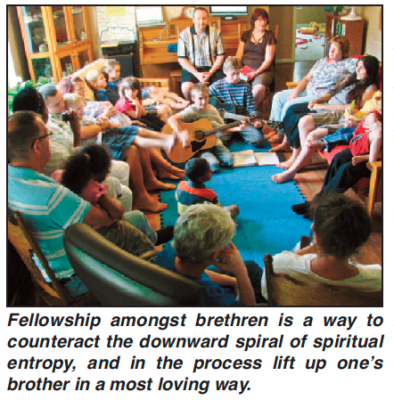
5. Fellowship. Our associations with one another within the ecclesia form the community that spirals outward, not inward towards entropy. Shame, humiliation, and self-condemnation are crucified with the old man, and the new person, filled with abundant life, is resurrected, as it were, to perfect order and completeness. We are told by Paul in I Corinthians 14:26 and 31 that fellowship is designed to edify and uplift one another, in the process of enduring to the end of the age (Matthew 24:23).
“How is it then, brethren? Whenever you come together, each of you has a psalm, has a teaching, has a tongue, has a revelation, has an interpretation. Let all things be done for edification … For you can all prophesy one by one, that all may learn and all may be encouraged.”
6. Work! Do not withhold your zeal to be a servant, and to overcome the temptation of laziness. The easy road, following others in society, to blend in and fear being ridiculed as different, is the road to death. It is the energetic and resourceful that hold sway in the world. This exercise in energy must apply to both our secular work and our spiritual pursuits.
“Do you see a man who excels in his work? He will stand before kings; he will not stand before unknown men” (Proverbs 22:29).
“Whatever your hand finds to do, do it with your might; for there is no work or device or knowledge or wisdom in the grave where you are going” (Ecclesiastes 9:10).
“Be kindly affectionate to one another with brotherly love, in honor giving preference to one another; not lagging in diligence, fervent in spirit, serving the Lord …” (Romans 12:10-11).
To attain good energy it is imperative that you obey the laws of health: a proper diet, exercise, plenty of sunshine and fresh air, adequate sleep, and correct thinking habits. To counter the effects of aging — we cannot stop it, but we can maintain good health while we do — we must live a vital, abundant life as did Jesus (John 10:10). This cannot be achieved without being in good health. We must learn the lesson of the ant and avoid laziness (Proverbs 6:6-11).
Our Perfectly Ordered Future!
The second law of thermodynamics, or entropy, tells us that chaos and disorder increase within a closed system, such as the universe. However, we have learned that God in His awesome creation of the physical world, through capturing the power of the sun and through photosynthesis converting it into carbonaceous compounds that comprise living things, has reversed the entropy we see operating all around us. Life reverses disorder, and it is this life that Jesus Christ came to give to us more abundantly.
Within the spiritual world we also reverse entropy. Having cleansed our spiritual beings we live in newness of life, within the unspeakable beauty and order of God’s family, the heavenly throne being our true home with its sea of glass, 24 elders and their thrones and crowns, the four living creatures, the seven spirits of God, and innumerable angels (Revelation 4:2-8; 5:6-11). This order is eternal; it will never pass away. Its energy and order are forever preserved. This energy and order may indeed typify the entire new heaven and new earth, which is going to replace the present order of things. We are to pray, “Your kingdom come, your will be done on earth as it is in heaven” (Matthew 6:10). If heaven’s order will not pass away, perhaps the future earth’s millennial re-creation will not pass away, at least until Satan is released after the 1,000 years (Revelation 20:7-10).
We have many questions that have not yet been answered, but rest assured that the present disorder of mankind’s social order, and the chaos and degeneration of the created world, will be replaced with order and renewal. Entropy will be reversed, at least for the living world. What an incredibly beautiful future we have to look forward to!
Bibliography
1. Coner Taslaman, Entropy and God, www.conertaslaman.com.
2. Dewey Larson, Nothing But Motion, North Pacific Publishers, Portland, Oregon, 1959.
3. Nick Connor, What is absolute zero — temperature — definition?, May 22, 2019, www.thermal-engineering.org.
4. James Strong, The New Strong’s Expanded Exhaustive Concordance of the Bible, edited by John R. Kohlenberger, III, Thomas Nelson, Nashville, Tennessee, 2001. All Hebrew and Greek words are sourced from this book.
5. Skip Moen, Spiraling in, Hebrew Word Study, September 15, 2016, www.skipmoen.com.
6. John Donne, No Man Is An Island, All Poetry, www.allpoetry.com

